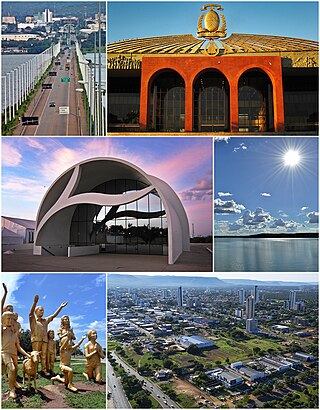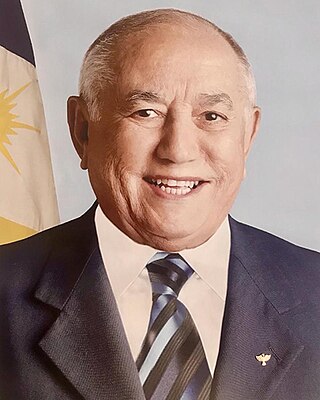
Tocantins is one of the 26 states of Brazil. It is the newest state, formed in 1988 and encompassing what had formerly been the northern two-fifths of the state of Goiás. Tocantins covers 277,620.91 square kilometres (107,190.03 sq mi) and had an estimated population of 1,496,880 in 2014. Construction of its capital, Palmas, began in 1989; most of the other cities in the state date to the Portuguese colonial period. With the exception of Araguaína, there are few other cities with a significant population in the state. The government has invested in a new capital, a major hydropower dam, railroads and related infrastructure to develop this primarily agricultural area. The state has 0.75% of the Brazilian population and is responsible for 0.5% of the Brazilian GDP.

The Araguaia River is one of the major rivers of Brazil, and a tributary of the Tocantins River.

Palmas is the capital and largest city of the state of Tocantins, Brazil. According to IBGE estimates from 2020, the city had 306,296 inhabitants. Palmas has a metropolitan area with 471,639 inhabitants.
Fabral was an off-road vehicle manufacturer based in Palmas, Tocantins, Brazil. Fabral was established in 2002 with money from the Mozambiquean Tricôs group. The project never got off the ground and the company closed down in 2003.

Jalapão State Park is a state park in the microregion of Jalapão in eastern Tocantins, Brazil. It contains a variety of landscapes including cerrado vegetation, sand dunes and flat-topped plateaus.

Mateiros is the easternmost city in the state of Tocantins. It is the only city in Tocantins to border the state of Piauí.
The Balsas River is a river of Tocantins state in central Brazil, a tributary of the Do Sono River.
The Formiga River is a river of Tocantins state in central Brazil.

Syngonanthus nitens is a grass-like species of Eriocaulaceae which exists in the region of Jalapão, state of Tocantins, Brazil - the region is part of the Brazilian cerrado. Its main characteristic is the bright and gold color, hence their common name "capim dourado", which literally means "golden grass".

Lagoa do Tocantins is a municipality in the state of Tocantins in the Northern region of Brazil.

Lizarda is a municipality in the state of Tocantins in the Northern region of Brazil.
Rio Sono is a municipality in the state of Tocantins in the Northern region of Brazil.

Ponte Alta do Tocantins is a municipality in the state of Tocantins in the Northern region of Brazil.

Santa Tereza do Tocantins is a municipality in the state of Tocantins in the Northern region of Brazil.

São Félix do Tocantins is a municipality in the state of Tocantins in the Northern region of Brazil.
The viola de buriti is a Brazilian stringed instrument made from the buriti palm tree. It is very lightweight, has four nylon strings and a tiny sound board and is fretless. It is found in the region of Jalapão in Tocantins and in northwest Minas Gerais.
Serra Geral do Tocantins Ecological Station is an ecological station in the states of Bahia and Tocantins, Brazil. It is one of the largest such units in the country, and protects a sparsely populated area of the cerrado biome. The main threat comes from frequent fires set by the local people in order to create cattle pasturage.
The Novo River is a river of Tocantins state, Brazil. It is a headwater of the Do Sono River.
The Soninho River is a river of Tocantins state, Brazil. It is a headwater of the Do Sono River.

José Wilson Siqueira Campos was a Brazilian politician. A member of multiple conservative political parties, he served as Governor of Tocantins on four occasions.












